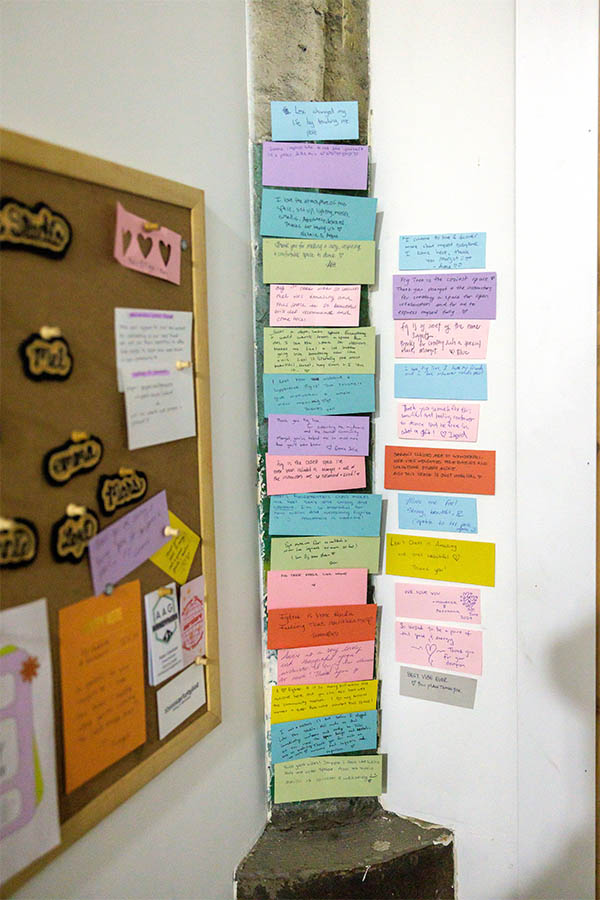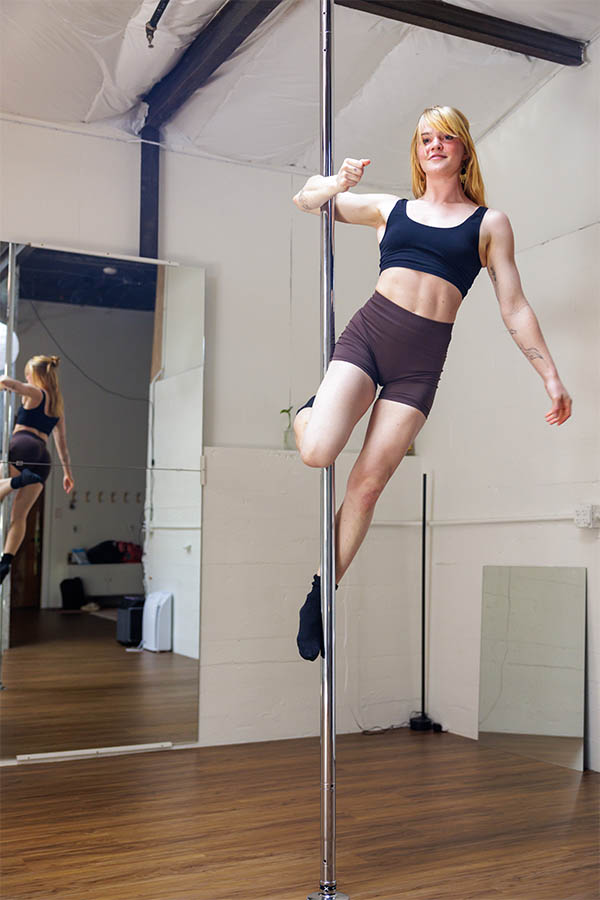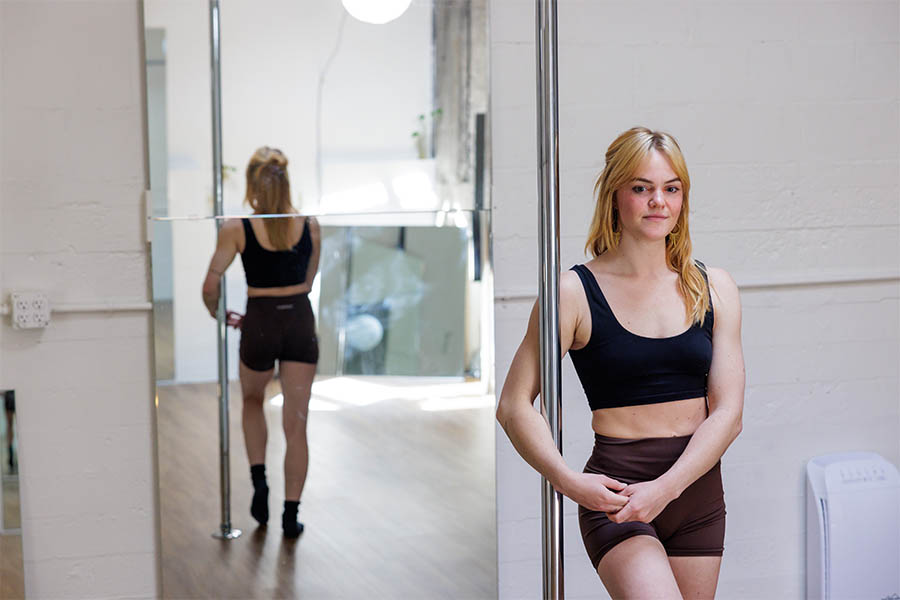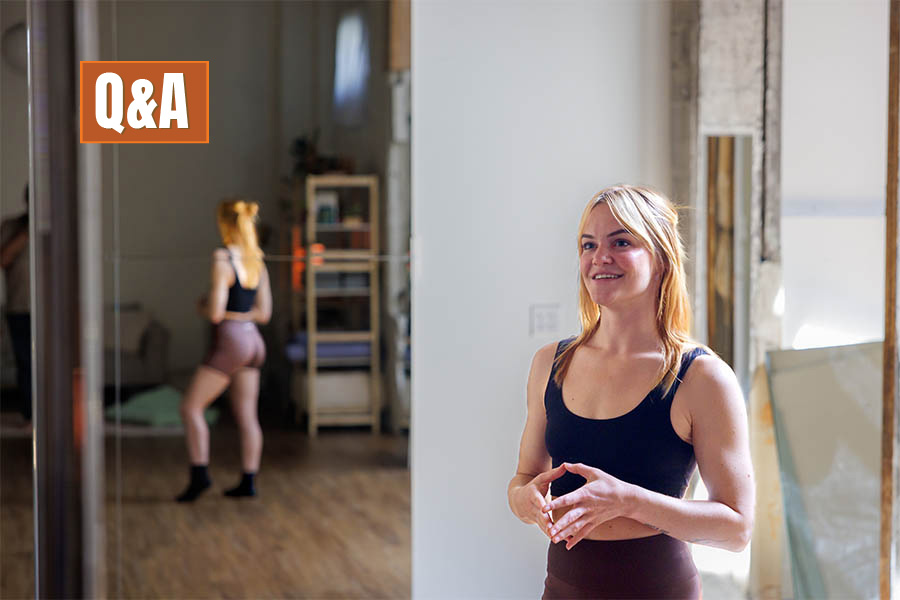As business slows in Portland’s strip clubs, interest in pole dancing climbs
Renowned for its nudie bars, Portland might as well be known as Strip City. Unofficially, the city is home to 50 establishments rated by the website The Ultimate Strip Club List. But business at the clubs has never been slower, according to one local dancer, known to regulars of Lucky Devil Lounge as “Margot.”
Despite the dip in stripping business, pole dancing — the pastime, the sport, the aerial artform— has never been more popular, especially among non-strippers. This has led to some tension and a discussion of pole’s roots in sex work at Portland’s half-dozen or so studios. Margot, who opened her own Fig Tree Studio in October in Northeast, says Portland’s stripping population doesn’t always feel welcome.
Seven years ago, she was an undergrad studying social work at the University of Oregon. Three years into her studies, she found herself unable to borrow more money due to a lack of credit. Stress and bitterness mounted. She considered dropping out. On a whim, she arranged to strip one night at a place far out of town. She told no one. She told herself if she felt degraded or objectified, she’d never do it again.
That night, she earned $500 — enough to cover her rent — and, to her relief, she was received by other dancers with warmth and acceptance. Being “on” onstage gave her a new confidence and she finally felt headed for financial independence.
“That night ended up being the most beautiful and, honestly, wholesome experience I’ve ever had,” she says.
Part dance studio, part community space, Fig Tree hosts support groups and business and real estate classes for strippers and other sex workers, in addition to a full slate of pole classes. Margot wants studio users to feel the same way she did her first night. The approach has worked so far, at least according to a pastiche of written messages stuck near the front door.

“Seems impossible to not love yourself in a place like this,” reads one.
Oregon Business interviewed Margot in her new studio in the Pickle Factory in industrial Kenton, where she talked “whorephobia,” guys who tip the minimum and what makes a good strip club DJ.
This conversation has been edited for clarity and length.
What was the moment you decided to open this studio?
I went to Europe by myself, and I was feeling really disconnected from myself. Body image issues were creeping up and I was just a little blue. I was in Barcelona and I booked myself an hour rental at a studio and they gave me the door code and let me go in and use the space by myself. And I just danced it out. I was in my flow and I was really feeling the music. And it immediately cured my mood. It was the only thing on that trip that brought me back. After that, as I kept traveling, the low feeling returned.
And I think a lot of the reason for that is my job. Even when I’m not feeling super confident at work, I fake it and the confidence comes back. It comes from being on stage and having to like, show up, versus like, traveling and slouching around wearing a hoodie the whole time and not feeling that energy that I feel at the club or at a studio.
I came home and just realized how important movement and sensual expression are to me. Not only for self-esteem but for regulating my emotions and being present.
Why the name Fig Tree?
It’s a Sylvia Plath quote from The Bell Jar. In it, she describes sitting at the base of a fig tree and looking up at all the figs, and each fig represents a different life path that she could choose. There was being a mom and having a family. Another was being a groupie and traveling around South America with a bunch of bands. They’re each so different that she realizes she can’t do all of them. And I’ve felt that kind of dilemma very deeply, like, for instance, I have a degree but I’ve never known what to do with it.
When I started thinking about this studio, I didn’t know if it would be a forever thing, but I knew if I didn’t try now, I’m always going to wonder what it would have been like. So I just went for it.
What makes this space unique?
We’re the only stripper-owned studio in Portland. We’re starting to lean into our niche a little bit with stuff specifically for strippers and sex workers more broadly. An example is hosting a home buying course for sex workers put on by House Proud PDX. Because sex work has some real differences from vanilla jobs, as we call them. Stuff like getting approved for loans and showing proof of income with bank statements can be difficult.
Because it’s hard to deal with so much cash?

Yeah, and there’s a lot of discrimination. Over the years, I’ve reported all my income and paid a lot in federal income taxes, and when I bought a car two or three years ago, the dealership actually recommended that I lie about my job to get approved for a loan.
If you’re buying a house and you’re a stripper, you’re immediately knocked down below the other people applying, just from the stereotypes and stigma.
Is it important to you to use the word “stripper”?
Absolutely, I think so. I think we’re largely moving away from the term “exotic dancer.” It has roots in colonialism and negative connotations, and a lot of clubs are moving away from that. We do have one class on our sign-up called Russian Exotic, which is a really specific name of a flow. So we might even rebrand that one.
If I ever tell people I’m a “dancer,” they ask what kind, or they might say, “Oh you mean like ballet?” Sometimes I’ll say I’m something like a “spicy dancer” — try to sneak around it.
We’re not allowed to use the word “stripper” on Instagram. Your account will get shadow-banned. I’m not allowed to send texts or emails for the studio because I’ve used the words “stripper” and “sex worker.”
Does stigma extend to the pole community and people who take pole classes?
I’d say no. For a lot of people, it’s a hobby or a sport, and they can kind of distance themselves from the stigma. I know there are some people who are a bit wary of posting pole videos online, so there still is some stigma. But I think a lot of people have found the way to avoid it is to be like, “This is a sport and not sexual or sensual.”
There was a hashtag a while back when pole dancing started becoming more mainstream, #NotAStripper, and it was exactly that: A way for non-stripper pole dancers to distance themselves from the idea of being a stripper.
Along with that, I feel like at first, a lot of people were trying to wear more athletic outfits versus like stripper outfits. I feel like even that has changed. There are people who sometimes embody the stripper image but sometimes still distance themselves from it.
How are the clubs doing?
I’d say for about a year, it’s been really slow here in Portland. We used to get a lot of bachelor parties and birthday parties and people from out of town, especially in the spring and summer. And we’re not getting that at all right now. There’s just incredibly reduced capacity at the clubs.
And unfortunately, the ones who do come in are incredibly cheap and rude and kind of, not our desirable customers. I feel like back in the good days, the good (customers) would set the example, and the bad ones would be like, ‘Oh s–t, I should have tipped a little more.”
Now, you go onstage and there’s maybe two dudes at the stage and each of them will tip $1 per song. You’re doing all these tricks. Or, say you just want to crawl around — crawling is really bad for your knees. Sometimes you’re leaving with $4 from a set and then not going up for another 50 minutes. And strippers don’t get paid hourly. We have no benefits. No vacation leave. We’re independent contractors and we actually pay to work at the club. So say on a Saturday night, I start at negative $120. Plus there’s the makeup, the outfits, the care that goes into showing up. So when people tip $1, oof, that’s all you’re making.
What’s the vibe in Portland compared to other areas?
We’re way more “dive bar” here. I’d say there’s like three or four clubs in town that feel a bit like Vegas, with the VIP rooms you rent by the hour and champagne bottle service. At a lot of those clubs, [the dancers] must wear heels, spray tan, fake nails, fake eyelashes, and look really glam.
The clubs like where I work, you can wear sneakers and knee-high socks, sometimes no makeup. There’s a lot more room for personal expression. We can dance to the music we want. It’s not just the curated party music that bigger clubs want.
So it’s a more casual environment here. We get a lot of women customers and couples. And for us, it’s more about putting on a show on stage with a lot of tricks, versus clubs where the stage money isn’t as important as the lap dances.

There’s been talk of strippers unionizing in Portland. [Dancers at Northwest Portland’s Magic Tavern voted to unionize in September, making the club the first unionized strip club in the city and the second in the country.] What are some common ways that clubs exploit dancers?
Well, first of all, I’d say there are certain frustrations and inconveniences for independent contractors but there’s also maybe some danger in becoming a full employee and gaining more rights and protections. In the end, we sacrifice a lot but we get to have more autonomy and keep a lot more of our money. We even get more privacy and don’t have mandatory reporting to the IRS. As an employee, things are a lot more by-the-book.
So for instance, I think there are laws where a club can’t require an employee to tip the staff of an establishment. As contractors, we all tip the staff — the security, the DJ, the bartender. If you don’t, you probably won’t get scheduled to work again. Fortunately, I work at a club where I really love and respect those coworkers and tipping them feels like the right thing to do. But I’ve definitely worked at clubs where I’ve felt hustled by the DJs, who were like, “This is all you’re going to tip? I’ll let the boss know.”
Clubs in Oregon also have the right to require that you be naked — you don’t get to decide. You can go “No, I’m not going to do that,” but you risk getting the good shifts taken away. Personally, I won’t get naked for $2 but clubs have the right to establish those rules.
There’s just a lot of gray area. I’ve been yelled at, called outrageous things. And there’s no way to report that. There’s no HR to go to.
And if I broke my ankle at work, I’d just be out of work with no compensation. I mean, I don’t really think that’s exploitation. It’s just one of the cons of being an independent contractor.
Who are the best tippers?
Laughs. Out of towners.
Portlanders really treat strip clubs here like dive bars, for better but mostly for worse. Some of them will just come in for a meal and stare at you on stage and not tip. Or they won’t tip on top of lap dances. When you get your hair done, or any kind of service done, you tip on top of that cost, even if it’s a big chunk of money. But now that’s so uncommon that anytime someone hands me a $20 after a dance, I’m like, “Are you from California?”
So, out of towners tip the best and then I’d say, our regulars. You know, people who’ve maybe grown to know us as performers and respect us and understand what we’re doing and how hard it is.
What makes a good strip club DJ?
Personally, somebody who trusts my musical judgment and my ability to capture the crowd, even at a slower tempo. I’ve had a lot of DJs try to tell me that my music is too slow, that I’ll lose the audience. And then they’ll play me like, Marshmello, which is really intense EDM.
I’d say it’s good to have a harmonious relationship between DJ and dancer, where we’re on the same, level playing field. I’ve had some DJs who thought they knew how to work a crowd better than me. It’s like, “Are you up there naked right now? I don’t think so.”
And a lot of good DJs will keep an eye on the stage and help keep us safe, and that’s really appreciated.
What’s your favorite song to dance to?
My go-to until the day I retire will always be “Retrograde” by James Blake.
Click here to subscribe to Oregon Business.




